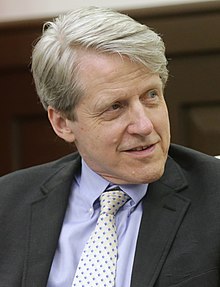Robert J. Shiller | |
|---|---|
 Shiller in July 2017 | |
| Born | Robert James Shiller March 29, 1946 |
| Academic career | |
| Field | Financial economics Behavioral finance |
| Institution | Yale University |
| School or tradition | New Keynesian economics Behavioral economics |
| Alma mater | Kalamazoo College University of Michigan (BA) Massachusetts Institute of Technology (PhD) |
| Doctoral advisor | Franco Modigliani |
| Doctoral students | John Y. Campbell[1] |
| Influences | John Maynard Keynes George Akerlof Irving Fisher |
| Contributions | Irrational Exuberance, Case-Shiller index, CAPE-ratio |
| Awards | Deutsche Bank Prize (2009) Nobel Memorial Prize in Economics (2013) |
| Information at IDEAS / RePEc | |
| Academic background | |
| Thesis | Rational expectations and the structure of interest rates (1972) |
| Signature | |
 | |

Robert James Shiller (born March 29, 1946)[4] is an American economist, academic, and author. As of 2022,[5] he served as a Sterling Professor of Economics at Yale University and is a fellow at the Yale School of Management's International Center for Finance.[6] Shiller has been a research associate of the National Bureau of Economic Research (NBER) since 1980, was vice president of the American Economic Association in 2005, its president-elect for 2016, and president of the Eastern Economic Association for 2006–2007.[7] He is also the co‑founder and chief economist of the investment management firm MacroMarkets LLC.
In 2003, he co-authored a Brookings Institution paper called "Is There a Bubble in the Housing Market?", and in 2005 he warned that "further rises in the [stock and housing] markets could lead, eventually, to even more significant declines... A long-run consequence could be a decline in consumer and business confidence, and another, possibly worldwide, recession." Writing in The Wall Street Journal in August 2006, Shiller again warned that "there is significant risk of a ... possible recession sooner than most of us expected.", and in September 2007, almost exactly one year before the collapse of Lehman Brothers, Shiller wrote an article in which he predicted an imminent collapse in the U.S. housing market, and subsequent financial panic.
Shiller was ranked by the IDEAS RePEc publications monitor in 2008 as among the 100 most influential economists of the world;[8] and was still on the list in 2019.[9] Eugene Fama, Lars Peter Hansen and Shiller jointly received the 2013 Nobel Memorial Prize in Economic Sciences, "for their empirical analysis of asset prices".[10][11]
- ^ Campbell, John Y. (2004), "An Interview with Robert J. Shiller", Macroeconomic Dynamics, 8 (5), Cambridge University Press: 649–683, doi:10.1017/S1365100504040027, S2CID 154975037
- ^ Grove, Lloyd. "World According to ... Robert Shiller". Portfolio.com. Retrieved June 26, 2009.
- ^ Blaug, Mark; Vane, Howard R. (2003). Who's who in economics (4 ed.). Edward Elgar Publishing. ISBN 978-1-84064-992-5.
- ^ "The Closing: Robert Shiller". The Real Deal. November 1, 2007. Retrieved December 2, 2012.
- ^ "The Yale Economics 2022 Annual Magazine Marks a New Era for the Department". Yale Department of Economics. Retrieved December 28, 2022.
- ^ "ICF Fellows". About. Yale University School of Management. Retrieved September 21, 2012.
- ^ "Past Presidents". Eastern Economic Association. Archived from the original on February 11, 2017. Retrieved February 9, 2017.
- ^ "Economist Rankings at IDEAS". University of Connecticut. Retrieved September 7, 2008.
- ^ "Economist Rankings at IDEAS". University of Connecticut. Retrieved August 10, 2017.
- ^ * Robert J. Shiller on Nobelprize.org , accessed 12 October 2020
- ^ "3 US Economists Win Nobel for Work on Asset Prices", ABC News, October 14, 2013